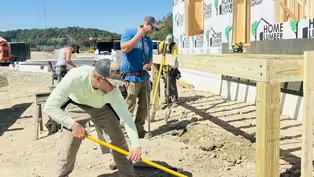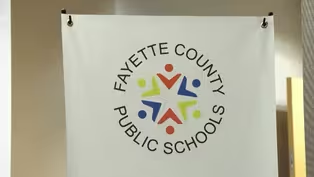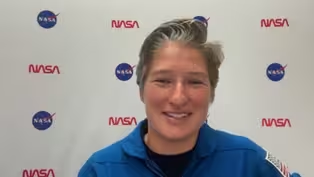
'Healing Appalachia' Moves to Kentucky
Clip: Season 4 Episode 62 | 5m 20sVideo has Closed Captions
The music festival raises money for drug recovery.
Tens of thousands of people made their way to Ashland this past weekend for "Healing Appalachia." The annual music festival raises money for drug recovery. It was held in Kentucky this year for the first time ever. Emily Sisk spoke with the executive director to learn more about the cause.
Problems playing video? | Closed Captioning Feedback
Problems playing video? | Closed Captioning Feedback
Kentucky Edition is a local public television program presented by KET

'Healing Appalachia' Moves to Kentucky
Clip: Season 4 Episode 62 | 5m 20sVideo has Closed Captions
Tens of thousands of people made their way to Ashland this past weekend for "Healing Appalachia." The annual music festival raises money for drug recovery. It was held in Kentucky this year for the first time ever. Emily Sisk spoke with the executive director to learn more about the cause.
Problems playing video? | Closed Captioning Feedback
How to Watch Kentucky Edition
Kentucky Edition is available to stream on pbs.org and the free PBS App, available on iPhone, Apple TV, Android TV, Android smartphones, Amazon Fire TV, Amazon Fire Tablet, Roku, Samsung Smart TV, and Vizio.
Providing Support for PBS.org
Learn Moreabout PBS online sponsorshipTens of thousands of people made their way to Ashland, Kentucky, this past weekend for Healing Appalachia.
It's an annual music festival that raises money for drug recovery.
And this year was the first time it was held in the Bluegrass State.
Our Emily Sisk spoke with the executive director to learn more about the cause.
We are joined now with Logan Terry, the executive director for Healing Appalachia.
Logan, thank you so much for joining us.
Yeah.
Thank you so much for having me.
Absolutely.
So we know that you all just wrapped up the music festival this past weekend in Ashland, but for maybe folks who aren't familiar, can you tell us what is healing Appalachia?
Yeah.
So healing Appalachia, it's it's the world's largest music festival is not the only large music festival that's focused on recovery.
The music festival is really kind of established, to celebrate recovery, and to bring connection to providers and to the community.
It looks like in the photos, it also was a huge crowd.
Do you know approximately how many people showed up this weekend?
Yeah.
It was it was amazing.
I mean, this year we saw, like, unprecedented and unexpected growth.
You know, we knew that moving the festival to Kentucky would potentially make it a larger festival than we've had in the past.
We were fortunate enough to to sell out completely at 20,000 tickets.
And then, you know, we have around 900 volunteers that help out each year that, you know, for their time, they also get free tickets.
So we had anywhere from, you know, 20,000 to probably, you know, 22,000 people there this year.
Well, that is a large amount.
And you brought up a good point that in the past this had been happening in West Virginia, if that's right, and this was actually your first year coming to Kentucky.
Will you tell me more about that?
Yeah, I think, you know, originally the organization and kind of, you know, planned or thought about, you know, the potential of moving it in between West Virginia and Kentucky and, you know, this year, whenever the opportunity presented itself to, to move it to the Boyd County Fairgrounds, you know, we were really excited to kind of take that, take that step.
And, you know, we're super grateful that we did.
And we heard from a lot of folks that they were very happy to have it in Kentucky.
Obviously, two of the biggest headliners were Chris Stapleton and Tyler Childers.
That in itself drew a lot of people.
And of course, those are household names for outside of Kentucky, but they are both from Kentucky.
You know, tell me, how significant was it to get those two headliners?
Cause there were dozens of others music musicians, but how significant was it to have them and have them both be from Kentucky?
Yeah, I you know, I think that it was a massive deal for so many different reasons.
I mean, it was a massive deal for for us.
And we were super grateful.
Hailing Appalachia as a music festival, you know, that is produced from, people from Appalachia and for people from Appalachia, you know, and the president of the organization, Dave Lavender, loves to use this, this term, that is actually perfect and that artists are typically like second responders, you know, like you think about first responders, as, you know, EMS and and the governments stepping in.
And then a lot of times directly after that, it's the artists and the people from the community that are kind of stepping in to help heal the community.
And that's kind of like a perfect picture of what this was.
We want to go back to asking you about kind of the mission.
We touched on it at the beginning, but can you tell me more about kind of who or what organizations would benefit from what happened this weekend?
What a lot of people don't know is kind of the impact that the festival and the organization has had.
I mean, it's for it's given over $1 million and in grant funding since it started, you know, and has given money to over 100 organizations.
The primary mission is to raise money from the festival to, in turn, be able to, to grant out money, to recovery programs in the Appalachian region and across the United States.
That is excellent.
And we have to ask for next year, 2026.
Any plans that you can tell us about?
Might you return to Kentucky?
Yeah, definitely.
I mean, I will say that it's definitely too soon to, to tell you exactly what the future holds.
But but I do know is that we absolutely loved our experience here in Kentucky and the collaboration that we had from the governor's office, the attorney general's office, and, you know, Boyd County and the Department of Tourism, you know, was completely, you know, unprecedented and amazing.
Our team put a heck of a lot of work into making the site what it was.
And so, you know, I wouldn't be surprised we're there again next year.
All right.
Well, we will keep our eyes out to see where you all land for 2026.
But Logan Terry with Healing Appalachia, thank you so much for your time and telling us everything about it.
Yeah.
Thank you so much for having me, Emily.
Thank you.
Emily.
Let's hope they come back next year.
The first Healing Appalachia music Festival was held in 2018.
Tyler Childers, who headlined this year's show, is also a co-founder of the organization.
The group is still determining exactly how much money was raised over the weekend.
Advocates Say Housing Trust Fund Needs More Money
Video has Closed Captions
Clip: S4 Ep62 | 3m 30s | Kentucky is facing a housing shortage that's expected to get worse. (3m 30s)
Democratic Lawmakers Express Concern with FCPS Leadership
Video has Closed Captions
Clip: S4 Ep62 | 4m 23s | More state lawmakers are expressing concern with Fayette County Public Schools. (4m 23s)
Kentuckian Among Newest Class of NASA Astronauts
Video has Closed Captions
Clip: S4 Ep62 | 5m 4s | More than 8,000 people applied, and only ten candidates were selected. (5m 4s)
Providing Support for PBS.org
Learn Moreabout PBS online sponsorship
- News and Public Affairs

Top journalists deliver compelling original analysis of the hour's headlines.

- News and Public Affairs

FRONTLINE is investigative journalism that questions, explains and changes our world.












Support for PBS provided by:
Kentucky Edition is a local public television program presented by KET


